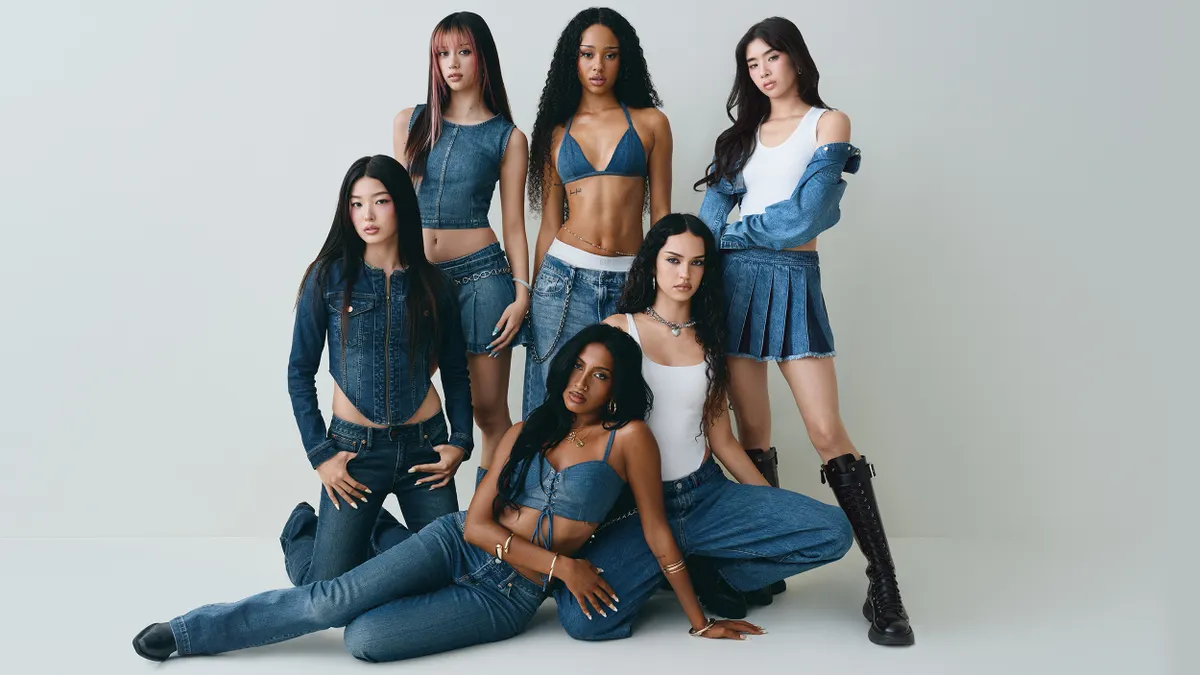After four grueling years of fundraising without seeing a dime of venture capital money, Sarah LaFleur was about to give up on hopes of securing the kind of capital that had quickly accelerated other e-commerce startups — like Warby Parker, Bonobos and Dollar Shave Club — into retail disruptors.
In meeting after meeting with VC firms, LaFleur said she encountered a subtle kind of sexism that made her doubt her business model — and herself.
"Whenever I couldn't raise, or whenever a VC turned me down, I'd think, well there's something wrong with me, there's something wrong with my business model," the co-founder and CEO of women's workwear brand MM.LaFleur told Retail Dive in an interview. "I would immediately turn it inward and I don't think I immediately attributed it to the fact that actually, maybe there is a blind spot in the world of venture capital and investing."
That blindspot could be part of why just 2% of the $85 billion invested by venture capital firms last year went to female-founded businesses like LaFleur's, according to data provided to Retail Dive by Pitchbook. In the retail industry, the divide isn't quite as stark, yet last year female-founded retail businesses still raised only about half of the amount of VC funding given to male founders, or $254.6 million versus $439.9 million.
Trends over time suggest VCs are increasingly investing in female-founded businesses. In 2008, the VC industry made just three investments in businesses led by female founders only, totaling $16.5 million. Firms that year made 48 investments in businesses led by male founders only, totaling $398 million. So far this year, 16 female-founded businesses have raked in investments totaling $232.4 million, while 28 male-founded businesses have garnered $258.5 million, according to data as of Aug. 30.
"We felt like we were always being talked down to rather than felt like we were in partnership."

Sarah LaFleur
Co-founder and CEO of MM.LaFleur
In the end, LaFleur did manage to raise some VC funding, although the company declined to share exactly how much capital. Just as she began to reorganize her business plan so the company could grow on its own cash, she met a VC investor who for the first time was, despite not being her target clientele, generally interested in the problem her business was solving for — providing working women with quality, comfortable and professional attire.
"Were it not for that attitude we probably just would have walked away from VC funding because honestly we were just so turned off by it at that point," she said. "We felt like we were always being talked down to rather than felt like we were in partnership."
Female entrepreneurs and investors have called out the VC industry for a culture that harasses, dismisses or demands too much from female founders. And as more venture-backed, female-led businesses like Rent the Runway, Stitch Fix and Glossier increasingly disrupt traditional retail, more VC firms are realizing that not investing in women-led businesses leaves a lot of money on the table.
Top retail companies by total VC capital raised 2008-2018
| Company name | Total VC raised (millions) |
|---|---|
| Jet | $570 |
| TechStyle Fashion Group | $410 |
| Wayfair | $358 |
| Fab | $340 |
| Fanatics | $320 |
| Vroom | $318 |
| Moda Operandi | $296 |
| The RealReal | $287 |
| Gilt Groupe | $276 |
| Chegg | $248 |
Source: Pitchbook
VCs need to gut check their gut check
Fundraising is an activity dreaded by nearly all founders regardless of gender. It's also one that too often gets compared to dating — a metaphor that skirts around the very real problem of sexual harassment that female founders have spoken about publicly in recent years. Certainly not all founders have experienced such extreme situations; however, many female founders describe a subtle sexism that is hard to combat.
"I think I was a little naive honestly, about the level of sexism that I encountered and it was so subtle," LaFleur said. "It's the subtle kind that's really scary because it's not overt sexism. It's that kind of sexism where you're not even sure what happened or how it actually played out and you could so easily blame yourself for what took place."
That's a sentiment other women founders have spoken about. Steph Korey, co-founder and CEO of luggage brand Away, recently recounted a story about a pitch with a potential VC investor who was more interested in setting up his Apple watch during a meeting than in viewing her slides.
"He could just be a general jerk and he would have done that with anyone, or maybe he did it because we were women, I don't know," she told Retail Dive in an interview.
"It's the subtle kind that's really scary because it's not overt sexism. It's that kind of sexism where you're not even sure what happened or how it actually played out and you could so easily blame yourself for what took place."

Sarah LaFleur
CEO and Co-Founder of MM.LaFleur
Korey co-founded her two-year-old business with Jen Rubio, president and chief brand officer of Away, whom she met while working at Warby Parker. Since launch, their business has raised $81 million in VC funding and has already begun to disrupt traditional luggage retail.
Shan-Lyn Ma, co-founder and CEO of wedding registry startup Zola, said she once had a meeting with a VC investor who told her he wasn't her target market, so he'd have to ask his wife or his assistant what they thought of the business before investing. While that comment may have had good intentions, Ma says the problem is that VCs need to look outside of themselves and see how companies of all kinds fit into the larger consumer market.
Ma's business was seeded with $500,000 from serial entrepreneur Kevin Ryan, who also founded Gilt Groupe (where Ma held executive roles) and Business Insider, among other companies. In the first few years after the business was founded in 2013, Ma only raised $40 million in VC funding, a relatively low number in terms of where the business was at. But this year, she secured another $100 million in Series D funding from top firms like Goldman Sachs, Thrive Capital and Comcast Ventures.
In an ideal business world, Ma's customer base would be split 50-50 men and women. In reality though, a majority of the consumer buying power is controlled by women, particularly when it comes to wedding registries. On the flip side, only 9% of VC decision makers are female, according to data from All Raise, an organization led by women in VC. That adds up to just 170 female investing partners at U.S. VC firms with a fund size over $25 million. Nearly 75% of VC firms do not have a female partner.
"VC investing as an activity particularly in the earliest phases is still ultimately a gut emotion. The VC investor has to feel a lot of personal conviction because it's a high risk environment," Ma told Retail Dive in an interview. Because it's harder, it may take a few more meetings, more research on target investors or asking certain questions for VC firms to understand the concept of a particular startup enough to want to funnel thousands of dollars into it.
"In the first few years of the business, during the fund raising process, any 'No' felt very personal. It felt like — I took it hard," she said. "Now, I think what I realize with experience — and what I try to share with other founders — is it's never personal because VCs are essentially in the business of mostly saying no, most of the time and it's never just a one way street."
Is VC biased against women?
Last year, Laura Huang set out to find out whether implicit bias against women was ingrained in VC culture.
During TechCrunch Disrupt, a startup incubating contest, the associate professor of business administration in the Organizational Behavior Unit at Harvard Business School observed Q&A interactions between 140 seasoned VCs and 189 entrepreneurs.
Using linguistic analysis and manual coding, she and her research assistants concluded that men were more likely to be probed with "promotion-focused" questions that allowed them to expand on business opportunity. Meanwhile, women were more often asked "prevention-focused" questions about the potential limitations of their business.
How women answered those questions came at a cost. Those who responded to prevention-focused questions with prevention-focused answers raised just $563,000 in funding. Those who shifted their responses to be promotion-focused raised an average of $7.9 million.
Most active VC retail investors from 2008 to 2018
| Investor name | Number of investments |
|---|---|
| Forerunner Ventures | 33 |
| First Round Capital | 29 |
| Accel | 28 |
| Kleiner Perkins | 28 |
| 500 Startups | 27 |
| SV Angel | 24 |
| Lerer Hippeau Ventures | 24 |
| New Enterprise Associates | 23 |
| Andreessen Horowitz | 23 |
| Greycroft | 21 |
| General Catalyst | 21 |
Source: Pitchbook
Research suggests bias extends beyond gender boundaries too; just 4% of startups are run by black women, who raise an average of $36,000, according to a report published this year from Digital Undivided.
Of the 10 retail companies to receive the most VC funding over the last 10 years, only three businesses had at least one female co-founder: Moda Operandi, The RealReal and Gilt Groupe, according to data from Pitchbook. Jet.com, founded by now Walmart e-commerce chief Marc Lore, has received the most VC funding for the sector — a whopping $570 million.
"I think it's human nature to feel more comfortable with and identify with people who are similar to you. You do it, everyone does it," Korey said. "But you don't make the best investing decisions by just investing in who you feel comfortable with."
Women take funding into their own hands
Over the last several years, female founders and investors say a shift is starting to take hold.
Some of that is thanks to the rise of female-founded VCs and networking groups with the specific mission to increase the number of women both giving and receiving funding. Many herald women like Katrina Lake, CEO of Stitch Fix, as a role model proving that female-founded businesses can yield high returns in the stock market.
"As we see more examples of women-founded businesses achieving success for their investors, we'll see more examples of investors wanting to have people on their teams who can connect with those founders and open them up to that pool of opportunity," Korey said. "Women founders are a huge opportunity for venture capitalists that they are largely missing out on right now."
This supports the argument that it's up to female founders to learn the patterns of the VC process in order to rake in more funds. Eurie Kim is a co-partner at Forerunner Ventures — an all female-founded VC firm that has made more investments than any other firm in the retail space. The company is well known for investing in businesses such as Warby Parker, Bonobos and Jet, but also has invested heavily in female-founded businesses like Away, Glossier, Outdoor Voices and Zola.
"Women founders are a huge opportunity for venture capitalists that they are largely missing out on right now."

Steph Korey
CEO and Co-Founder of Away
Kim is also one of 34 senior female investors from institutionally backed VC firms who, through the organization All Raise, aim to get more women funded and more women into funding positions. Within five years, the organization aims to increase the percentage of female founders who receive funding to 25% and double the percentage of women in VC partner roles over the next 10 years.
"I think historically, there is an access question. If you don't know how to get to the right investor or how to pitch your idea in the right way, it is difficult to get funding," Kim told Retail Dive in an interview. "But there's also the open question of: what company are you pitching?" Venture capital money isn't the right answer for a lot of businesses, Kim added. And many have proven they can still succeed on their own dime.
"I think organizations like All Raise are directly getting out there to say, 'How can we teach women what all of the nuances are of this industry and how to build their businesses and teams in a way that a venture investor would want to invest?'" Kim asked. "It's building network and building education."
In 2013, Anu Duggal founded the Female Founders Fund with her co-partner Sutian Dong. The firm, which focuses on early-stage investing in female talent, has invested in businesses like Billie, Zola, Rent the Runway and Eloquii. When she started her fund, she saw female-founded businesses as "an undiscovered opportunity."
"When you think about what an entrepreneur looked like 10 to 20 years ago, he needed a specific skill set, whereas now I think with technology disrupting all different industries, you have founders that come just with different skill sets that are more relevant now," she said. Much of what the fund does is help women break into the VC network with the backing of a fund.
Historically, VCs haven't loved funding the retail industry generally because it often involves buying retail space and inventory. But now, Duggal said that's become a necessary evil.
VCs should fix their own culture problem
Not everyone agrees the onus should be on women to solve the problem.
LaFleur recalls the topic coming up once on an panel she sat on. Next to her was an institutional female investor who said women needed to know their numbers cold. But to LaFleur, there shouldn't be a higher standard for women founders than for their male counterparts.
"We demand too much of our female founders and expect them to know too much," LaFleur said. "I'm a female founder, and I take it with a grain of salt. But I think the people with money have to see money, they have to see their returns in people who are unlike themselves."
In some cases, LaFleur has found it more difficult to pitch to female investors. At one point an angel investor told LaFleur she was only investing in "serious" businesses grounded in hard sciences and tech, and that she'd seen too many fashion startups.
"I felt like especially with the women-focused angel networking groups, they put you through the ringer," she said. "They want to see your P&L and your balance sheet and your business plan and it better be 50 pages long and they have so many detailed questions for you — unnecessary levels of detail that made pitching to those networks really, really painful."
Diversity in VC leadership has become more top of mind for firms recently, Kim said, adding that a lack of this has caused homogeneity of funding in both the types of ideas and the people that are winning investments.
Within the last one to two years, though, Ma at least said she's noticed a huge shift, particularly as the media has highlighted issues in the industry and those who are driving solutions. "I am very optimistic because I do think for the first time we are starting to see behavior change in a very positive way," she said.





















